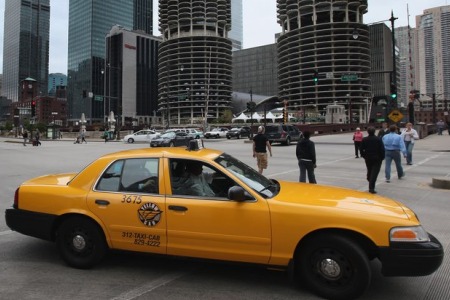
Members of Chicago’s disability community say the low number of accessible taxis is a civil rights issue that must be addressed as soon as possible.
“I’ve waited as short as 15 minutes, but as long as eight hours, and that’s completely unacceptable,” said Ayonna Collins, who travels in a wheelchair because of her cerebral palsy. She is a member of the Independent Movement of Paratransit Riders for Unity, Vehicles, Equality (I.M.P.R.U.V.E), an advocacy group that supports paratransit riders.
Mayor Rahm Emanuel, the Department of Business Affairs and Consumer Protection (BACP), and the Mayor’s Office for People with Disabilities (MOPD) announced Tuesday that the city is developing a plan to more than double the number of wheelchair accessible taxis by the end of 2018.
Chicago has 6,000 taxis, but only 163 are designed to comfortably accommodate people with a disability, according to the Chicago Department of Business Affairs and Consumer Protection. Less than 3 percent of Chicago’s fleet actually cater to them, whereas New York City will have half of its fleet accessible by 2020. That change is one Chicago should implement as soon as possible, Marca Bristo, president and CEO of Access Living said in a joint hearing of the Committee on License and Consumer Protection and the Committee on Human Relations Tuesday.
“Addressing the committee, she said, “If any of you were in a hurry to get to your next meeting, you could walk out on LaSalle Street and hail a cab and be on your way in minutes, but not me or my colleagues here today.”
Bristo said the wait times are typically far too long and said that this issue needs to be looked at and treated as a civil rights issue.
Ronald Antwine is a dispatcher for Central Dispatch, a hotline designed for wheelchair customers who want to request a wheelchair accessible vehicle. He said that the drivers want to help, but there just aren’t enough of them.
“We need more drivers,” said Antwine. “A lot of times, drivers are in route, but tied in traffic.”
People can make a reservation by calling 1-855-WAV-1010. There is also an App called Open Taxi Chicago.
Bristo, along with the members of IMPRUV, Access Living and other advocates want the city to adopt four approaches, all which mirror New York City’s.
She said that half of Chicago’s taxis need to be accessible. To help supplement the cost of purchasing, maintaining or converting wheelchair accessible vehicles (WAVs), there must be new incentives and subsidies. She said that won’t happen without strict enforcement measures like penalties for drivers who don’t participate and owners who do not meet their mandate. Lastly, a surcharge on taxi rides will help establish a fund to cover those needs.
Under Chicago’s rideshare, or Transportation Network Provider Ordinance, which went into effect at the beginning of September, new mandates were created to increase the number of wheelchair accessible vehicles. The ordinance will also find additional funding sources.
The Rideshare ordinance now requires taxi licensees, who have at least 10 medallions, or vehicles, to also have 10 percent of their vehicles become wheelchair accessible by the end of 2018. The new requirement will help add at least 204 more taxis to the already 163 in the system. A percentage of the cost that owners will be responsible for will be subsidized by the Accessibility Fund. Fees from rideshare and taxi companies pour into that fund. Current wheelchair accessible vehicles will have to be replaced when they can no longer function safely.
Both Ald. Emma Mitts (37th Ward), who chairs the License and Consumer Protection Committee, and Ald. Ariel Rebroyas (30th Ward), who chairs the Human Relations Committee showed their support at a news conference prior to the joint hearing.
“I’m sure we don’t think about their day-to-day, but we should have some compassion,” said Mitts. “Anything can happen at any given time so that we can be in their situation.”
“This is not my issue or Ald. Mitt’s issue, it is everyone’s issue in the City of Chicago,” said Rebroyas.
The next City Council meeting is Oct. 8th at 10 a.m.



